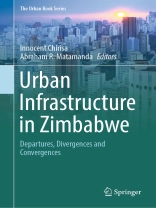The book provides insights into urban infrastructure debates and discourses in Zimbabwe. Through an inter-disciplinary and multi-disciplinary approach, the book explores the theoretical, conceptual and lived experiences in urban infrastructure. The book focuses on case studies relating to urban transport, public housing, water and sanitation and Geographical Information Systems (GIS) among other substantive issues relating to urban infrastructure and services.
Table des matières
Infrastructure, utilities and services: Theoretical keystones.- Urban development and the financing of low-income housing in Zimbabwe, post-2000.- Encroachment of the Harare central business district boundary into bordering suburban areas: Implications for spatial policy.- The search for sustainable transport infrastructure in Harare: Integrating intelligent transport systems.- Traffic congestion reduction measures for Mbudzi Roundabout, Harare.- Slum development and property values of the Harare eastern suburbs.- Higher education institutions and the socio-economic sustainability of ‘Declining’ towns.- Conversion of ‘Bachelor’ into family hostels in Mbare, Harare: Lessons from South Africa.- Decentralised wastewater treatment plant for University of Zimbabwe technical staff housing, Hatcliffe Harare: A site analysis.- People-centred initiatives as a response to infrastructure collapse in Harare.- Parking space management and revenue collection in Masvingo city.- Innovative infrastructure financing in small towns: A comparison of Marondera Municipality (Zimbabwe) and Thulamela Local municipality (South Africa).- Using GIS technology in the provision of urban infrastructure in slum settlement upgrading: The case of Hopley, Ward 6, Harare South.- Constructed wetlands as alternative to conventional wastewater treatment: The case of Gimboki, Mutare.- Geodatabase and infrastructure for the informal manufacturing sector in Harare.












